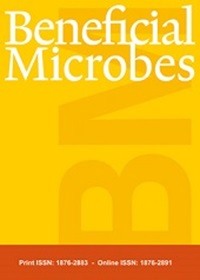Lactiplantibacillus plantarum and faecal microbiota transplantation can improve colitis in mice by affecting gut microbiota and metabolomics
IF 3
4区 医学
Q2 MICROBIOLOGY
引用次数: 0
Abstract
Gut microbiota may have therapeutic effects on inflammatory bowel disease (IBD). Regulating intestinal microbiota through Lactiplantibacillus plantarum (L. plantarum) and faecal microbiota transplantation (FMT) is a novel approach to treating IBD. This study aimed to explore the effect of L. plantarum and FMT pretreatment in alleviating colitis in mice. Five groups of mice (n = 6 per group) were included: CON group, DSS group (dextran sodium sulphate-induced colitis mice), LP-DSS pretreatment group (colitis mice were given strain L. plantarum and 5% DSS), DSS-FMT group (mice pretreated with faecal microbiota transplantation were given 5% DSS), and LP-FMT pretreatment group (mice pretreated with faecal microbiota transplantation and L. plantarum were given 5% DSS). Serum metabolites and intestinal microbiota were analysed by 16S rRNA sequencing liquid chromatography-mass spectrometry (LC-MS). The results demonstrated that L. plantarum and FMT improved gut microbiota in mice by increasing Firmicutes and decreasing the Bacteroidetes. In the serum metabolomics analysis, there were 11 differential metabolites in the DSS-FMT and LP-FMT pretreatment groups, and these differential metabolites were mainly glycerophospholipids and sphingolipids. It is worth noting that Lachnospira and Lactobacillus were positively associated with 8 differential metabolites. These results suggest that L. plantarum and FMT can regulate intestinal microorganisms and serum metabolomics to alleviate inflammation.植物乳杆菌和粪便微生物群移植可通过影响肠道微生物群和代谢组学改善小鼠结肠炎
肠道菌群可能对炎症性肠病(IBD)有治疗作用。通过植物乳杆菌(L. plantarum)和粪便微生物群移植(FMT)调节肠道微生物群是治疗IBD的新途径。本研究旨在探讨植物乳杆菌和FMT预处理对小鼠结肠炎的缓解作用。将小鼠分为5组,每组6只,分别为CON组、DSS组(葡聚糖硫酸钠诱导结肠炎小鼠)、LP-DSS预处理组(结肠炎小鼠给予植物乳杆菌和5% DSS)、DSS- fmt组(粪菌群移植预处理小鼠给予5% DSS)和LP-FMT预处理组(粪菌群移植预处理小鼠给予5% DSS)。采用16S rRNA测序-液相色谱-质谱法(LC-MS)分析血清代谢物和肠道菌群。结果表明,植物乳杆菌和FMT通过增加厚壁菌门和减少拟杆菌门来改善小鼠肠道微生物群。在血清代谢组学分析中,DSS-FMT和LP-FMT预处理组有11种差异代谢物,这些差异代谢物主要是甘油磷脂和鞘脂。值得注意的是,毛螺旋体和乳杆菌与8种差异代谢物呈正相关。这些结果表明,植物乳杆菌和FMT可以调节肠道微生物和血清代谢组学,减轻炎症。
本文章由计算机程序翻译,如有差异,请以英文原文为准。
求助全文
约1分钟内获得全文
求助全文
来源期刊

Beneficial microbes
MICROBIOLOGY-NUTRITION & DIETETICS
CiteScore
7.90
自引率
1.90%
发文量
53
审稿时长
>12 weeks
期刊介绍:
Beneficial Microbes is a peer-reviewed scientific journal with a specific area of focus: the promotion of the science of microbes beneficial to the health and wellbeing of man and animal. The journal contains original research papers and critical reviews in all areas dealing with beneficial microbes in both the small and large intestine, together with opinions, a calendar of forthcoming beneficial microbes-related events and book reviews. The journal takes a multidisciplinary approach and focuses on a broad spectrum of issues, including safety aspects of pro- & prebiotics, regulatory aspects, mechanisms of action, health benefits for the host, optimal production processes, screening methods, (meta)genomics, proteomics and metabolomics, host and bacterial physiology, application, and role in health and disease in man and animal. Beneficial Microbes is intended to serve the needs of researchers and professionals from the scientific community and industry, as well as those of policy makers and regulators.
The journal will have five major sections:
* Food, nutrition and health
* Animal nutrition
* Processing and application
* Regulatory & safety aspects
* Medical & health applications
In these sections, topics dealt with by Beneficial Microbes include:
* Worldwide safety and regulatory issues
* Human and animal nutrition and health effects
* Latest discoveries in mechanistic studies and screening methods to unravel mode of action
* Host physiology related to allergy, inflammation, obesity, etc.
* Trends in application of (meta)genomics, proteomics and metabolomics
* New developments in how processing optimizes pro- & prebiotics for application
* Bacterial physiology related to health benefits
 求助内容:
求助内容: 应助结果提醒方式:
应助结果提醒方式:


